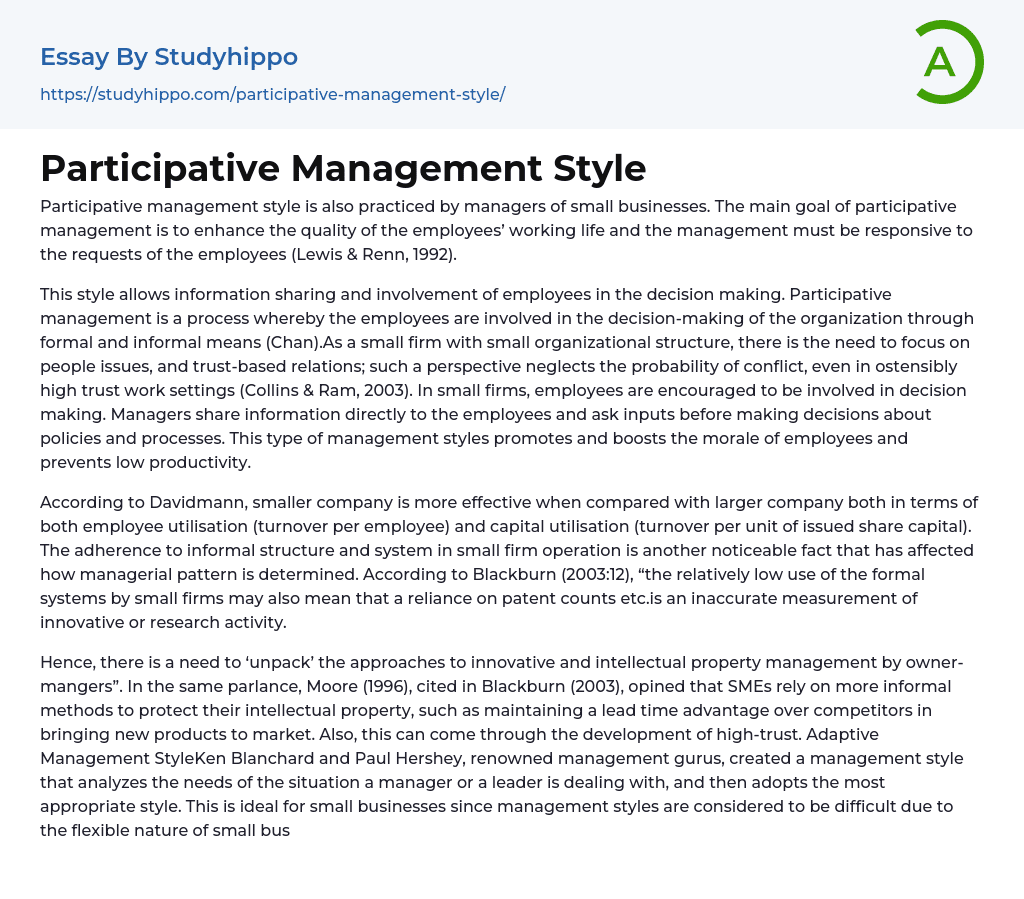Managers of small businesses also practice participative management style with the purpose of improving the quality of the employees' work life. The management must be attentive to the employees' requests, as stated by Lewis & Renn (1992).
Participative management involves the sharing of information and employee involvement in decision making. Small firms should prioritize people issues and trust-based relationships, but should not overlook the potential for conflicts in seemingly high trust work environments (Collins & Ram, 2003). In small firms, managers should encourage employee participation in decision making by sharing information and soliciting input before policies and processes are decided upon. This management style enhances employee morale and prevents low productivity.
Davidmann suggests that small companies are more efficient than large companies in utilizing both employee turnover and capital turnover. This is due to
...the informal structure and system that small businesses tend to adhere to in their operations. As noted by Blackburn (2003:12), the limited use of formal systems in small firms may also result in an inaccurate measurement of their innovative or research activity, relying on patent counts and other metrics as a narrow gauge of success.
Hence, according to Blackburn (2003), it is necessary to examine the strategies used by owner-managers to manage innovation and protect intellectual property. Moore (1996), cited by Blackburn, suggests that small and medium-sized enterprises (SMEs) often use informal methods to safeguard their intellectual property, such as creating a lead time advantage over competitors or building strong relationships based on trust. To address the challenges of managing small businesses, renowned management experts Ken Blanchard and Paul Hershey developed an Adaptive Management Style that involves analyzing the needs of a situation and
choosing the most appropriate management approach. Slatter (1992:159) points out that managing fast growth in entrepreneurial firms can be an extremely difficult task.
According to Collins and Ram (2003), owners of small firms struggle to balance flexibility with continuity and security, making management a balancing act between strong leadership and decentralized task-oriented management, entrepreneurial and professional management, and processes promoting organizational cohesion and individual responsibilities. Strong leadership is crucial in small firms to overcome the confusion that comes with growth and maintain organizational cohesiveness (Collins & Ram, 2003). As Slatter (1992) noted, achieving a balance between stability and flexibility is challenging but possible through a strong yet democratic leadership style.
Small businesses tend to focus on operational plans rather than strategic plans due to their limited resources. According to Shrader et al (1989), a strategic plan is a written long-term plan that includes a corporate mission statement and organizational objectives while operational planning involves setting short-term objectives for specific functional areas like finance, marketing, and personnel. Smaller firms do not commonly engage in strategic planning due to a lack of time and staffing, as the top manager must address daily operational issues within functional areas instead (ibid).
Shrader et al. (1989) cite Robinson, Logan, and Shalem, who found that small firms do not benefit financially from strategic planning, but that operational planning has a positive effect on performance. Robinson suggests that the reason for this is that small businesses often do not invest sufficient time and effort into developing strategic plans. However, Robinson also found that small businesses that hired outside help for strategic planning achieved better performance than those that did not plan. Overall, operational planning offers
more flexibility for small firm owner-managers.
By implementing this form of planning, individuals are able to adjust their management approach based on the current circumstances.
- Entrepreneur essays
- Walt Disney essays
- Henry Ford essays
- Bernie Madoff essays
- Rockefeller essays
- Bill Gates essays
- Steve Jobs essays
- Being A Leader essays
- Servant Leadership essays
- Leadership Experience essays
- Leadership Qualities essays
- American Dream essays
- Barriers To Entry essays
- Capitalism essays
- Central Bank essays
- Compensation essays
- Consumerism essays
- Economic Development essays
- Economic Growth essays
- Economic Inequality essays
- Economic System essays
- Economy essays
- Employment essays
- Export essays
- Finance essays
- Free Trade essays
- Gross Domestic Product essays
- Human Development essays
- Income Inequality essays
- Industry essays
- Inflation essays
- International Business essays
- International Trade essays
- Macroeconomics essays
- Materialism essays
- Max Weber essays
- Microeconomics essays
- Minimum Wage essays
- Monetary Policy essays
- Monopoly essays
- Pricing essays
- Profit essays
- Recession essays
- resources essays
- Taxation essays
- Trade essays
- Unemployment essays
- Warehouse essays
- World economy essays
- John Locke essays




